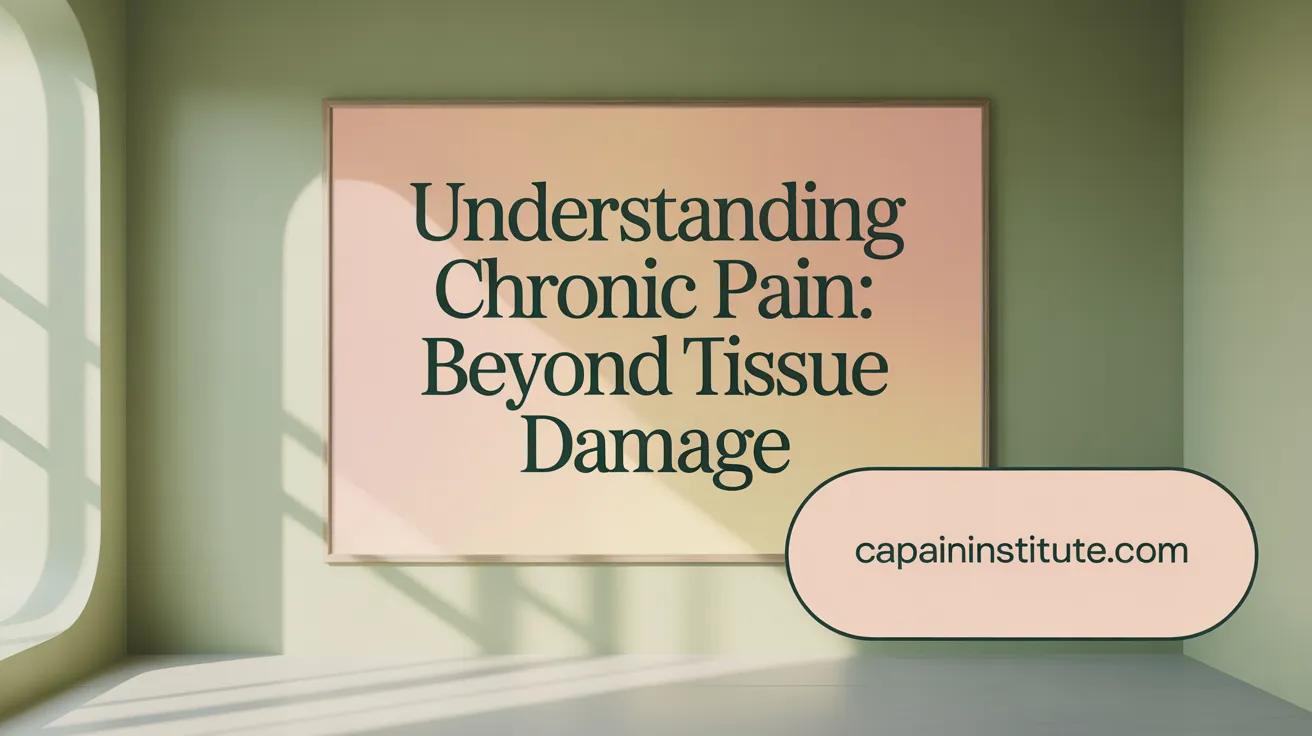Understanding the Complexity of Chronic Pain and Its Management
Chronic pain affects millions, often resisting traditional treatments and deeply impacting quality of life. Specialist care emerges as a critical component in addressing chronic pain effectively by providing precise diagnosis, comprehensive treatment plans, and a multidisciplinary approach tailored to the unique needs of each patient.
The Complexity of Chronic Pain and the Need for Specialized Care

What drives chronic pain besides tissue damage?
Chronic pain is a complex condition primarily driven by neurophysiological mechanisms of chronic pain rather than ongoing tissue damage. Central sensitization plays a significant role, where the nervous system becomes hypersensitive to pain signals. Additionally, altered descending control pathways in the nervous system contribute to persistent pain sensation even in the absence of new injury or inflammation. This understanding clarifies that chronic pain is not "psychosomatic," which helps reduce stigma and misunderstanding.
Why is medication alone often inadequate for chronic pain management?
Medications alone frequently fail to effectively manage chronic pain over the long term. This inadequacy is due to the development of tolerance and side effects from long-term pharmacological treatments. Furthermore, medications cannot fully address the complex changes in the nervous system that sustain chronic pain. Chronic pain involves altered pain processing pathways, which medication cannot entirely reverse. Relying solely on medication also risks over-medicalization without improving overall functioning and quality of life, as discussed in chronic pain management challenges and multidisciplinary approaches.
How do psychological and social factors influence chronic pain?
Beyond physical mechanisms, psychological and social factors significantly affect how individuals experience and cope with chronic pain. Stress, anxiety, depression, and a person’s pain coping styles can amplify pain perception and impact daily functioning. Conversely, positive coping strategies, such as mindfulness and cognitive behavioral therapy, help improve emotional well-being and reduce the burden of pain. Social support and patient education also play important roles in managing chronic pain effectively.
Why is it important to understand the multifactorial nature of chronic pain?
Recognizing that chronic pain results from biological, psychological, and social factors is critical for effective management. This multifaceted perspective promotes multidisciplinary approaches including medication, physical therapy, psychological support, and self-management education. Understanding the neurophysiological basis of pain helps patients accept their condition without fear, enabling them to engage in activity and therapies that improve quality of life. It shifts the focus from simply trying to eliminate pain to managing its impact on functioning and well-being.
Comprehensive Evaluation and Diagnosis by Pain Management Specialists

What qualifications do pain management specialists have?
Pain management specialists are highly trained physicians who undergo rigorous education paths. This includes completion of medical school, followed by residency in fields such as anesthesiology, neurology, or physical medicine and rehabilitation. Many also complete an additional fellowship specifically in pain medicine. Board certification in these specialties confirms their expertise and skills related to pain physiology, diagnosis, and treatment methods. This specialized training enables them to tackle complex pain conditions effectively (Pain Medicine Specialist role).
How do pain specialists diagnose chronic pain conditions?
Pain specialists employ a comprehensive diagnostic approach. It begins with a detailed patient history and thorough physical examination to understand the pain's nature and impact. Advanced imaging techniques, including MRI, CT scans, and X-rays, help identify structural or pathological changes (Pain Management Specialist Education). Specialized tests like electromyography (EMG) and nerve conduction studies are used to assess nerve function and pinpoint neuropathic pain sources. Such in-depth evaluations allow specialists to accurately diagnose pain origins and develop personalized treatment plans (Pain management diagnostic tests).
Role of advanced diagnostic tools and procedures
Specialized diagnostic tools are essential in pain management. Imaging identifies tissue abnormalities, while electrophysiological tests evaluate nerve and muscle function. Additionally, specialists may use diagnostic nerve blocks to isolate pain sources (Specialized nerve blocks). These tools guide targeted therapies, including minimally invasive procedures, optimizing patient outcomes and reducing unnecessary treatments (Minimally invasive pain procedures).
Importance of thorough evaluation to guide individualized treatment plans
Accurate diagnosis is fundamental to effective pain management. Understanding the precise cause and contributing factors helps specialists craft tailored treatment strategies. These plans often combine medications, physical therapy, psychological support, and interventional procedures (Comprehensive pain treatment plans). Such individualized care improves symptom relief, enhances physical function, and elevates quality of life for patients living with chronic pain (Multidisciplinary approach to pain management).
Multidisciplinary Approaches: Beyond Medications

Why is a multidisciplinary approach critical for chronic pain management?
Chronic pain involves complex interactions among biological, psychological, and social factors. Because of this complexity, effective management requires a comprehensive multidisciplinary pain management team that includes medical providers, physiotherapists, psychologists, and occupational therapists who work collaboratively.
This integrated approach does more than address the physical symptoms of pain; it also supports the patient's emotional well-being, promotes self-management, and focuses on improving functional ability and quality of life. Such collaboration prevents fragmented care and helps patients engage actively in managing their condition (Integrated Care in Managing Chronic Pain).
What non-medication treatments do specialists employ?
Specialists in pain management use a variety of non-medication treatments to address both the physical and emotional aspects of chronic pain:
- Psychological therapies: These include cognitive-behavioral therapy (CBT), mindfulness, acceptance and commitment therapy, and thought-challenging techniques. Psychological interventions target emotional responses such as anxiety and depression, which can worsen pain experiences (Psychological techniques in pain management.
- Physical therapy and graded activity: Physiotherapists help patients gradually increase physical activity tailored to their capacity, using pacing and goal setting (Specialist physiotherapy in pain management). Occupational therapists assist in improving daily functioning without escalating pain.
- Interventional procedures: Pain management specialists employ minimally invasive techniques such as nerve blocks, epidural steroid injections, spinal cord stimulation, radiofrequency ablation, and peripheral nerve stimulation. These procedures aim to reduce inflammation, target pain pathways, and improve mobility (Chronic pain treatment options).
Collaboration and integrated care models
Integrated care models combine these disciplines in a coordinated way, often including behavioral health providers, to ensure consistent treatment goals and patient support (Collaborative-Care Models in Pain Treatment. This collaboration improves access to evidence-based treatments and monitors progress through standardized assessment tools.
Such teamwork enhances outcomes by addressing not just pain intensity but also its impact on quality of life, emotional well-being, and physical function (Multidisciplinary approach to chronic pain.
This multidisciplinary, patient-centered approach reflects current best practices and offers the most effective path toward living well with chronic pain.
Personalized, Patient-Centered Care and Education

How do specialists personalize chronic pain treatment?
Pain management specialists develop individualized treatment plans that consider each patient’s unique medical history, lifestyle, pain characteristics, and psychological well-being. By carefully assessing these factors, specialists tailor therapies including medications, physical and psychological therapies, interventional procedures, and lifestyle modifications. Treatment is continuously monitored and adjusted to align with the patient's goals and evolving needs, ensuring a dynamic approach that promotes optimal outcomes.
Why is patient education important in chronic pain management?
Patient education plays a vital role by explaining the complex neurobiological mechanisms driving chronic pain, such as central sensitization and altered nerve signaling. This knowledge helps reduce fear and misconceptions about pain, decreasing stigma and encouraging patients to maintain activity without fear of harm. Education empowers individuals to develop effective self-management skills, fostering acceptance of persistent pain and improving emotional resilience, which are essential for long-term pain coping and better quality of life.
Addressing misconceptions about pain
Many patients mistakenly believe pain always signals tissue damage or that chronic pain is psychosomatic. Specialists work to correct these myths by providing pain neuroscience education, which clarifies that ongoing pain can persist without active pathology. This shift in understanding reduces harmful avoidance behaviors and supports adaptive coping strategies, ultimately improving physical and emotional functioning.
Supporting long-term self-management and avoiding re-medicalization
Chronic pain management focuses on empowering patients to manage their condition actively through multidisciplinary pain-management programmes that integrate physical activity, cognitive-behavioral techniques, and coping skills training. Specialist guidance helps patients maintain progress and resilience even after setbacks, avoiding unnecessary medicalization that can undermine self-efficacy. Continuous support emphasizes collaboration and reinforces sustainable strategies for living well with chronic pain despite ongoing pain.
Advanced Interventional Techniques and Their Benefits

What interventional procedures do pain specialists offer?
Pain management specialists provide minimally invasive procedures designed to target and alleviate chronic pain effectively. These include nerve blocks, epidural steroid injections, radiofrequency ablation, and spinal cord stimulation. Such treatments reduce inflammation and modulate pain signals by interfering with nerve pathways, offering relief and enhancing patient function.
How do these procedures complement other pain treatments?
These interventional procedures serve as vital components alongside medications, physical therapy, and psychological treatments. By reducing pain intensity, they help patients engage more comfortably in rehabilitation exercises and daily activities. This in turn lessens the need for systemic medication use, particularly opioids, lowering associated risks (Managing chronic pain with your doctor).
Use of imaging guidance for precision
Advanced techniques use imaging tools like fluoroscopy and ultrasound to accurately guide needle placement and treatment delivery. This precision ensures maximal effect and reduces the risk of complications.
Specialist expertise in performing these procedures
These interventions require pain specialists trained extensively through fellowships and board certifications. Their expertise ensures personalized treatment plans balancing efficacy and safety to improve overall quality of life (Comprehensive pain management options).
Overall, advanced interventional pain management techniques represent an essential element in multidisciplinary care, optimizing symptom relief while supporting functional recovery and medication stewardship.
Improving Outcomes Through Specialist Care and Multidisciplinary Coordination

What are the benefits of seeing a pain management specialist?
Pain management specialists bring advanced training and expertise to create tailored treatment plans. Their precise diagnosis of pain sources allows for targeted interventions such as nerve blocks, spinal injections, and specialized medications that improve pain control and enhance patients' daily functioning.
Specialists also emphasize psychological support, addressing emotional factors like anxiety and depression that often accompany chronic pain. This reduces dependence on opioids and other medications prone to side effects or addiction. Learn more about the advantages of pain management specialists.
By employing a range of therapies—including cognitive behavioral techniques and physical therapy—specialists support both short-term relief and long-term improvement in quality of life.
How does coordination among healthcare providers enhance care?
Effective chronic pain management relies on multidisciplinary teamwork. Integrated care coordinates doctors, psychologists, physical therapists, and other health professionals to align treatment goals and facilitate timely referrals.
This approach ensures patients receive consistent education about their condition and self-management strategies. By addressing physical symptoms and mental health comprehensively, teams improve functional outcomes and patient satisfaction.
Regular communication within the care team helps monitor progress and adjust treatments promptly, enhancing safety and effectiveness while minimizing risks such as opioid-related complications. For more details on pain management doctor roles, visit the linked resource.
Why is addressing mental health comorbidities important?
Anxiety and depression are common in individuals with chronic pain and can worsen pain perception and disability. Including behavioral health therapies in pain management improves coping skills and emotional wellbeing.
Methods like mindfulness, cognitive-behavioral therapy, and other psychological techniques not only ease psychological distress but also reduce the physical impact of pain, supporting better overall management.
What are the long-term benefits of coordinated pain management programmes?
Multidisciplinary pain-management programmes (PMPs) focus on self-management and improving function rather than just eliminating pain. Evidence shows such programmes yield sustained improvements in daily activities, emotional health, and quality of life.
By fostering patient acceptance, promoting exercise, and using psychological techniques, these programmes reduce reliance on medications and invasive procedures.
Specialist teams providing these coordinated approaches ensure adequate intensity and ongoing support for enduring benefits.
Together, specialist care and multidisciplinary coordination form a comprehensive framework that improves chronic pain outcomes, enhances quality of life, and reduces treatment risks through personalized, integrated strategies.
The Indispensable Role of Specialist Care in Chronic Pain Management
Specialist care is vital in effectively managing chronic pain, which is a complex, multifaceted condition. Through advanced training, comprehensive diagnostics, multidisciplinary collaboration, and personalized treatment plans—including education and interventional procedures—pain management specialists dramatically improve patient outcomes. Recognizing chronic pain’s neurophysiological basis and incorporating psychological and physical therapies empower patients to regain function and quality of life. As chronic pain continues to pose significant challenges, specialist-led integrated care remains the cornerstone of effective, compassionate pain management.
